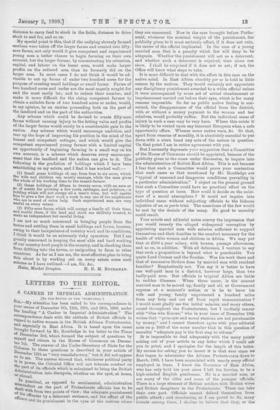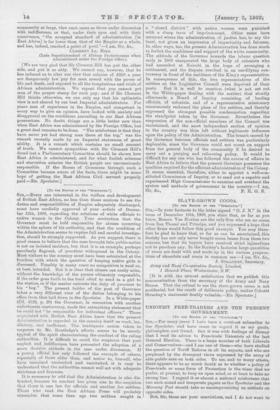LETTERS TO THE EDITOR.
A CANKER IN IMPERIAL ADMINISTRATION. ure TON Iterros OF '1'1111 "Bl'1WI'AT011..") attention has been called to the correspondence in Your issues of December 5th, 12111, 19th, and 26th, 1908, under the heeding "A Canker in Imperial Administration," The correspondence deals with the attitude of British officials in regard to native women in the British African Protectorates, and especially in East Africa. It is based upon the cases brought forward by Mr. Routledge in his letter to the Times of December 3rd, which formed ties subject of questione by myself and others in the House of Commons on Decem- ber 7th. The answer of the Under-Secretary of State for the c olonies to these questions is described in your article of 'December 12th as "very unsatisfactory," but it did not appear !1° nle. The answer showed that, whichever political party 18 In power, the Colonial Office will not tolerate conduct on tbe part of its officials which is calculated to bring the British A-dnainistration into disrepute, whether on the spot, at home,
or abroad.
.1a practical, as opposed to sentimental, administration Tiacenduct on the part of Protectorate officials has to be ofealt with from two points of view : the adequate punishment off offender by a deterrent sentence, and the effect of the ence and its punishment in the eyes of the natives where
they are concerned. Now in the case brought before Parlia- ment, whatever the nominal weight of the punishment, the publicity given to it must seriously affect, if it does not ruin, the career of the official implicated. In the case of a young married man that is a penalty which few will deny to be adequate. Whether the punishment will act as a deterrent, and whether such a deterrent is required, time alone can show. I shall be surprised if it does not so act ; if not, the Office will know what steps to take.
It is more difficult to deal with the effect in this case on the native mind. In East Africa chastity per se is held in little
esteem by the natives. They would certainly not appreciate any disciplinary punishment awarded to a white official unless it were accompanied by some act of actual chastisement or imprisonment carried out before their eyes, which is for many reasons impossible. So far as public native feeling is con- cerned, the disappearance of the official from the district,' with or without a money payment to the woman and her relatives, would probably suffice. But the individual sense of injury in such a ease may be very keen. Where this exists it is likely to be vented upon any innocent European when a safe opportunity offers. Whence come native wars, &e. So that, apart from reasons of morality, it is absolutely essential to put down with a stern hand any acts of the nature in question. On that point I am in entire agreement with you.
But I earnestly deprecate your suggestion that a Committee of the House of Commons should he appointed, because of the publicity given to the cases under discussion, to inquire into the administration of British East Africa. This is not because I fear that such a Committee would prove your contention that such cases as that mentioned by Mr. Routledge are "typical of unsound and dangerous conditions prevailing in a particular administration." I object on the general ground that such a Committee could have no practical effect on the typo of question at issue. How could it decide on the exist- ence of a moral atmosphere P It could not inquire into individual cases without subjecting officials to the hideous injustice of an ex parte trial. The assertions of the few would be met by the denials of the many. No good to morality ' could result.
Your article and editorial notes convey the impression that you would remedy the alleged widespread corruption by appointing inarried men with salaries sufficient to support themselves and their families in the comfort necessary for the health of white women and children in Africa. We may put that at £500 a year salary, with houses, passage allowances, and so on, in addition. With all deference, I venture to say that such a proposition is beyond what is practicable. You quote Lord Cromer and the Soudan. Was his work there and that of successive Sirda.rs done by married men with resident families P Emphatically not. You say it is better to have one well-paid man in a district, however large, than two badly-paid men. But officials in tropical Africa are liable to sudden illnesses. When these occur, is the nearest married man to be moved up, family and all, at Government expense at a moment's notice, or is be to leave his wife and young family unprotected a hundred miles from any help and cut off from rapid communication P would most gladly see the initial salaries, and many others, raised throughout the Protectorates, but I cordially concur with "One who Knows," who in your issue of December 19th writes that "principle and moral stamina are not purchasable by money," and I cannot therefore agree with your editorial note on p. 1053 of the same number that in this question of morality "adequate pay is the first step to reform."
It is impossible to deal adequately with the many points arising out of your article in any letter which I could ask you to print, and I apologise for the length of this letter.
My excuse for asking you to insert it is that ever since we first began to administer the African Protectorates down to March, 1905, I have been acquainted with nearly every official employed in them. •I know the Governor of East Africa, who has only held his post since I left the Service, to be a
high-minded English gentleman. He is a married man, as are many of the older and some of the younger officials.' There is a large 'element of British settlers with British wives and British daughters in the Protectorate. These can take their own part. Officials cannot defend themselves from public attack ; and numbering, as I inn proud to do, many friends among them, 1 decline to believe that they, or the
community at large, view such cases as those under discussion with indifference, or that, under their eyes and with their connivance, "the accepted standard of administration [in East Africa] is far lower than that of the Empire as a whole, and has, indeed, reached a point of peril."—I am, Sir, &c.,
CLEMENT LL. HILL (Late. Superintendent of African Protectorates when administered under the Foreign Office).
[We are very glad that Sir Clement Hill has put the other side, and put it so ably. We cannot say, however, that he has induced us to alter our view that salaries of £250 a year are dangerously low pay for men armed with the power of life and death, and exposed to all the temptations and trials of African administration. We repeat that you cannot get men of the proper stamp for such pay; and if Sir Clement Hill thinks otherwise, we can only say that his optimistic view is not shared by our best Imperial administrators. For years men of experience in the Empire, and competent in every way to give an opinion, have looked with anxiety and disapproval on the conditions prevailing in our East African possessions. No doubt things are a little better now than when East Africa was administered by the Foreign Office, but a great deal remains to be done. "The misfortune is that they have never yet had strong men there at the top," was the remark recently made by an Imperial statesman of great ability. It is a remark which contains no small amount of truth. We cannot sympathise with Sir Clement Hill's dread lest a Parliamentary Committee should be shown how East Africa is administered, and for what foolish schemes and starvation salaries the British people are unconsciously responsible. If the House of Commons through such a Committee became aware of the facts, there might be some hope of getting the East African Civil servant properly paid.—En. Spectator.]













































 Previous page
Previous page